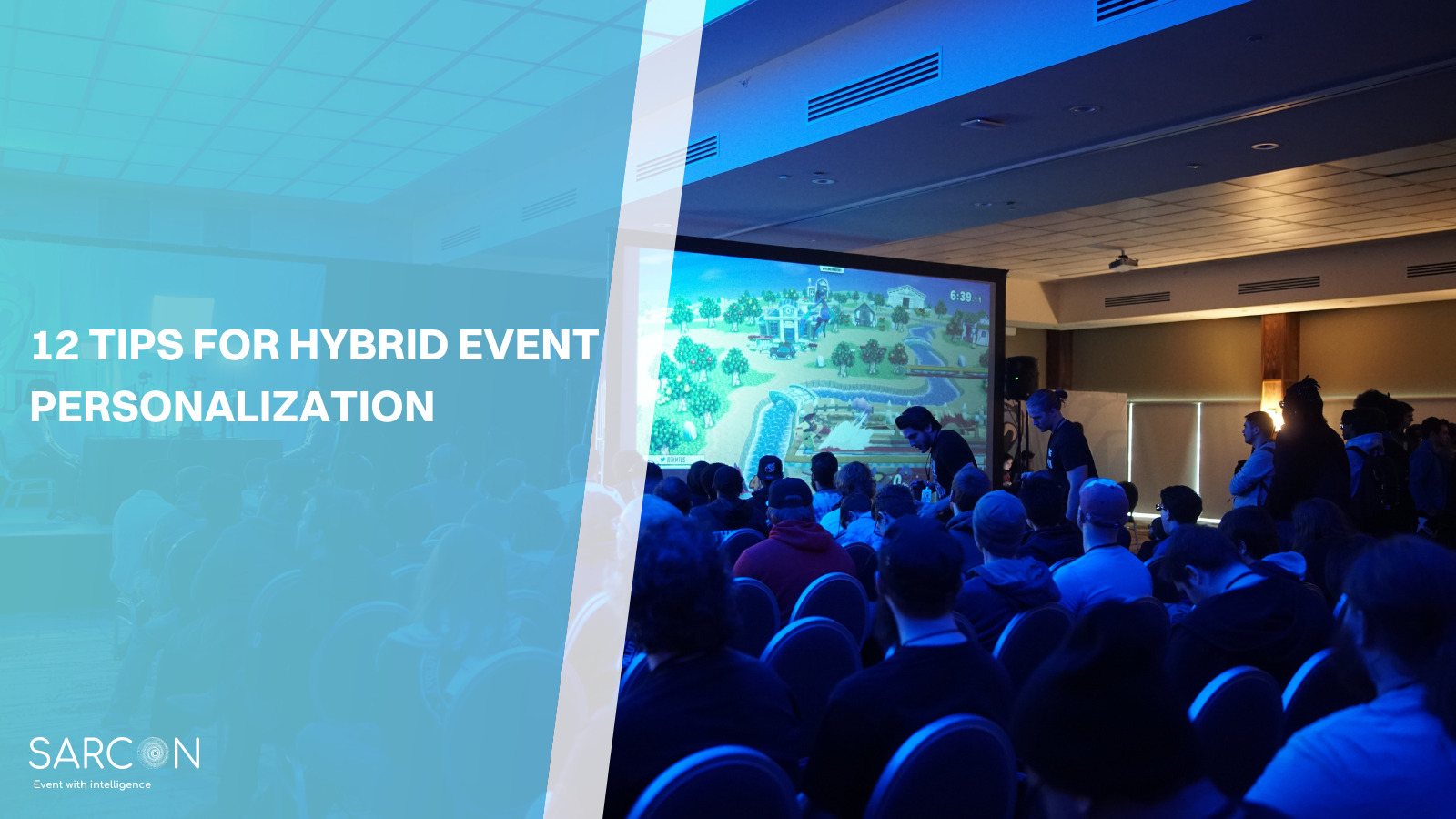It’s 2022, and hybrid events are still going strong. In fact, they’ve become an even more integral part of the event landscape over the past few years. So what does a successful hybrid event strategy look like in this day and age? How can organisers implement better strategies to scale events for stronger ROI? Keep reading to find out!
As we move into the 21st century, technology continues evolving at an unprecedented pace. And with it, the way we communicate and interact with each other. In the world of event planning, this has led to the rise of hybrid events.
An April 2021 survey of C-suite executives from multinational companies in the U.S., the UK, France, Japan, and the Netherlands found that 43% of respondents were investing in hybrid (physical and digital) marketing experiences to make offerings more innovative and to increase the personalisation of products and services.
What Are Hybrid Events?
A hybrid event is a blend of online and offline experiences that are tailored to meet the needs of today’s connected consumers. It combines the best in-person and online experiences and can take many forms. Still, at its core, a hybrid event is designed to give attendees the flexibility to choose how they want to participate. For example, someone who is unable to travel may be able to attend virtually. In contrast, those who are able to make it in person can enjoy the benefits of an immersive, face-to-face experience.
Benefits Of Hybrid Event
There are many benefits of hosting hybrid events. Perhaps most importantly, hybrid events allow you to reach a larger audience than you would with an in-person event alone. This is because people who might not normally be able to attend your event (due to location, time constraints, etc.) can participate virtually. Additionally, hybrid events are more cost effective than traditional in-person events, as they require less investment in venue rental, catering, and other physical logistics. And because hybrid events are often shorter in duration than their in-person counterparts, they can end up being more engaging for attendees – meaning that you’re more likely to achieve your event goals.
Your Hybrid Event Strategy
Any successful event, hybrid or otherwise, requires great planning and coordination. As you begin to build your hybrid event strategy, there are a few key questions you’ll need to answer. First, is this an internal or external event? If it’s an external event, you’ll need to consider how you’ll market and promote the event to make sure that the right people are in attendance. You’ll also need to have the right event management software in place to help with things like registration, scheduling, and communication. Internal events may not require as much marketing, but you’ll still need a good handle on who will be attending and their expectations. Once you’ve answered these basic questions, you can fully develop your hybrid event strategy. Here is a comprehensive event strategy you can consider:
Assign Company Goals
Your hybrid event strategy should be designed to help you achieve your company’s goals. Whether increasing brand awareness, generating leads or boosting sales, make sure your event is aligned with what you want to achieve. And don’t forget to set KPIs! Without measurable goals, it will be difficult to determine whether or not your hybrid event was successful.
Effective Event Marketing
A successful hybrid event strategy requires effective marketing and promotion. You’ll need to market the event to both online and offline audiences and promote it through various channels. Traditional marketing methods like print ads, radio spots, and TV commercials can help reach offline audiences. And online methods like email marketing, social media campaigns, and pay-per-click ads can help reach online audiences.
- Creating a landing page for your event
- Using social media to promote your event
- Creating promotional videos or podcasts
- Running ads targeting potential attendees
Creating a Personalised Experience
One of the benefits of hybrid events is that they can offer a more personalised experience than traditional events. With hybrid events, you can use technology to create customised experiences for your attendees. For example, you can use attendee data to send targeted emails and create personalised name badges. You can also utilise social media to connect with your attendees before, during, and after the event.
Make the Most of Your Ticketing System
Your ticketing and pricing strategy will play a big role in the success of your hybrid event. You’ll need to balance making your event affordable and generating enough revenue to cover your costs. And you’ll need to create a pricing structure that encourages people to attend your event’s online and offline components.
Think about ways to make your hybrid event more accessible for people who can’t afford to travel or take time off from work. You could offer discounts for early bird tickets, group tickets, or tickets purchased in advance. You could also offer scholarships or free tickets for low-income attendees. And you could consider streaming the event online so that people can watch from home.
Utilise Technology To Enhance The Experience
Technology can help you create a more immersive and engaging experience for your hybrid event attendees. You can use it to stream the event live, record presentations, and offer interactive features like chat rooms and Q&As. You can also use it to create virtual reality experiences, gamification elements, and Augmented Reality (AR) applications.
By using technology to enhance the experience of your hybrid event, you’ll be able to reach a broader audience and create a more memorable event for everyone involved.
Plan For The Future: Sustainability & Scalability
When creating your hybrid event strategy, it’s important to think about the future. How will you make your event sustainable? And how will you scale it up if it’s successful?
There are several ways to make your hybrid event more sustainable. You could use recycled materials, offset carbon emissions, or partner with green businesses. And you could consider using virtual reality technology to reduce the need for travel.
When thinking about how you’ll scale your event, consider both the online and offline components. If you’re expecting a large turnout, you’ll need to ensure you have enough space and resources to accommodate everyone. And if you’re planning to stream the event online, you’ll need to ensure you have enough bandwidth and server capacity to handle the traffic.
By planning for sustainability and scalability from the start, you’ll be able to create a hybrid event that people can enjoy for years to come.
Get Everyone Involved
Another benefit of hybrid events is that they make it easy for everyone to feel included in the event experience. Whether attendees are watching from home or attending in person, they’ll be able to participate in the event and interact with other attendees. And with live streaming, you can even include attendees who are unable to attend in person.
Creating a Unified Experience
One of the challenges of hybrid events is that you need to unify the experience for both online and offline attendees. This can be challenging because you’re dealing with two different groups of people with different needs and expectations. But you can do a few things to unify the experience, like using the same branding and messaging for both online and offline attendees. And you can also use technology to create a seamless experience for all attendees.
Provide Feedback Opportunity
It’s essential to get feedback from your attendees after the event. This feedback will help you understand what worked well and what didn’t work so well. It will also help you improve the experience for future events. You can collect feedback through surveys, social media, and post-event interviews.
When To Host A Hybrid Event
Here are a few critical considerations for developing a successful hybrid event strategy. One of the first steps in planning a successful event is determining who will attend and what they want from experience. You can use this information to determine how much emphasis your event should put on online and offline components. It is also essential to have a solid marketing strategy in place to draw attendees to your hybrid event. Last but not least, it’s crucial to work with a dependable hybrid event platform provider like Sarcon, who can assist you in carrying out your vision and running a successful event.
As you can see, there’s a lot to consider when it comes to planning hybrid events. But with careful planning and execution, hybrid events can be highly successful – and they’re only going to become more popular in the years ahead. So if you’re thinking about incorporating hybrid elements into your next event, now is the time to start planning!
Expand Your Hybrid Event Strategy
If you’re like most event professionals, you’re probably thinking about how to make your events more hybrid. After all, with the rise of virtual and augmented reality, it’s becoming increasingly easy to add a digital component to your in-person events.
But what if you could take your hybrid event strategy even further? What if, instead of just adding a digital component to your in-person events, you could use technology to create entirely new types of hybrid events?
Here are some ideas to get you started:
- Use virtual reality to transport attendees to different locations without leaving the event space.
- Use augmented reality to enhance the in-person experience by overlaying digital content on top of the physical world.
- Use mixed reality to create hybrid event experiences that combine the best of both the physical and digital worlds.
Incorporating Hybrid Events Into Your Event Strategy
If you’re thinking of incorporating hybrid events into your event strategy, there are a few things to keep in mind:
- Plan for both in-person and virtual attendees: When planning your hybrid event, consider the needs of both in-person and virtual attendees. This includes providing adequate networking opportunities for both groups and offering breakout sessions that all can access.
- Consider the technical aspects: One of the challenges of hybrid events is ensuring that the technical aspects run smoothly. There are many things to consider, from live streaming to managing chat rooms. Make sure you have a solid plan and test everything ahead of time to avoid any technical issues on the event day.
- Promote your event: Like any other event, you’ll need to promote your hybrid event to ensure that people are aware of it and know how to access the virtual component. Use social media, email marketing, and other channels to reach your target audience.
Conclusion
For those still on the fence about holding a hybrid event, I hope the information presented here has tipped the scales in your favour. Hosting a hybrid event can offer various combined benefits from both in-person and virtual events, giving you the best of both worlds. In addition to those great benefits, there are some unique additional benefits to hosting a hybrid event that you may not get with other types of events. Using the marketing ideas and strategies we’ve shared above, you are ready to start promoting your hybrid event and attracting more virtual and in-person attendees. If you want to know how Sarcon can help with your hybrid event planning and execution, reach out today!


